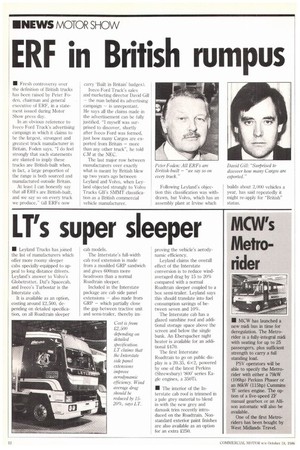ERF in British rumpus
Page 14

If you've noticed an error in this article please click here to report it so we can fix it.
• Fresh controversy over the definition of British trucks has been raised by Peter Foden, chairman and general executive of ERF, in a statement issued during Motor Show press day.
In an obvious reference to Iveco Ford Truck's advertising campaign in which it claims to be the largest, strongest and greatest truck manufacturer in Britain, Foden says, "I do feel strongly that such statements are slanted to imply these trucks are British-built when, in fact, a large proportion of the range is both sourced and manufactured outside Britain.
At least I can honestly say that all ERFs are British-built, and we say so on every truck we produce," (all ERFs now carry 'Built in Britain' badges).
Iveco Ford Truck's sales and marketing director David Gill — the man behind its advertising campaign — is unrepentant. He says all the claims made in the advertisement can be fully justified. "I myself was surprised to discover, shortly after lveco Ford was formed, just how many Cargos are exported from Britain — more than any other truck", he told CM at the NEC.
The last major row between manufacturers over exactly what is meant by British blew up two years ago between Leyland and Volvo, when Leyland objected strongly to Volvo Trucks GB's SMMT classification as a British commercial vehicle manufacturer. Following Leyland's objection this classification was withdrawn, but Volvo, which has an assembly plant at Irvine which builds about 2,000 vehicles a year, has said repeatedly it might re-apply for "British" status.
































































































































































































